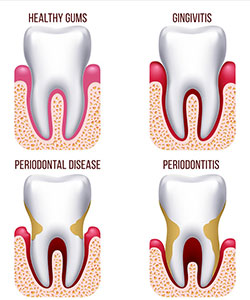Gum Disease
Gum disease, also known as periodontal disease, is an infection of the gums surrounding your teeth. Gum disease is one of the top reasons for tooth loss in adults, and because it is virtually pain-free, many patients do not know they have the disease. During each regular checkup, your dentist will check for signs of periodontal disease by measuring the space between your teeth and gums.

What causes gum disease?
Gum disease is caused by a buildup of plaque (a sticky form of bacteria that forms on the teeth). If the plaque is not removed (by flossing, brushing, and regular dental checkups), it will continue to build up and create toxins that can damage the gums. Periodontal disease forms just below the gum line and creates small pockets that separate the gums from the teeth. Periodontal disease has two stages: gingivitis and periodontitis.
- Gingivitis — This is the early stage of gum disease, when the gums become red and swollen, and bleed easily. At this stage, the disease is treatable and can usually be eliminated by daily brushing and flossing.
- Periodontitis — If left untreated, gingivitis will advance into periodontitis, and the gums and bone that support the teeth will become seriously and irreversibly damaged. Gums infected with periodontitis can cause teeth to become loose, fall out, or be removed by a dentist.
Certain factors can increase a patient’s risk of developing periodontal disease, including:
- Smoking or using chewing tobacco
- Diabetes
- Certain types of medication such as steroids, anti-epilepsy drugs, cancer therapy drugs, calcium channel blockers, and oral contraceptives
- Bridges that no longer fit properly
- Crooked teeth
- Old fillings
- Pregnancy
While it is possible to have periodontal disease and not know it, some symptoms can include:
- Gums that bleed easily
- Red, swollen, tender gums
- Gums that have pulled away from the teeth
- Persistent bad breath or bad taste
- Pus between your teeth and gums
- Permanent teeth that are loose or separating
- Any change in the way your teeth fit together when you bite
- Any change in the fit of partial dentures
Treating Gum Disease
Treatments for gum disease can vary depending on the severity of each individual case. Typical treatments include:
- Non-surgical treatments such as at-home periodontal trays, and scaling and root planing (deep cleaning)
- Periodontal surgery and laser gum surgery
- Dental implants
Preventing Gum Disease

What Sets Us Apart
Patient Centered Dentistry for Your Healthiest Smile
Patient Testimonials
Our Dental Patients Say It Best
Trustindex verifies that the original source of the review is Google. Taylor was very good and made sure everything was done to my liking. Everyone there is excellent!Trustindex verifies that the original source of the review is Google. The staff is extremely friendly. Every step of the way they were keeping me updated with it on what they were going to do next. There were no surprises. The doctor sit down with me and explained everything in detail, and took all my questions. She looked like she was not in any hurry and she was only focused on my care. I do refer patients to this office, as I am a physician. I've never had a complaint from any patient. I wish I could give them six stars!Trustindex verifies that the original source of the review is Google. Another great visit to the Neely Dental Practice. Polite, friendly staff - from the initial encounter to the last. Definitely will recommend to others.Trustindex verifies that the original source of the review is Google. Jennifer did a wonderfully thorough job on my cleaning! Best office ever 🤍Trustindex verifies that the original source of the review is Google. Amazing staff. Caring, efficient, always your best interest and options at heart.Trustindex verifies that the original source of the review is Google. Everyone is very friendly, they're on time. I highly recommend this place.
